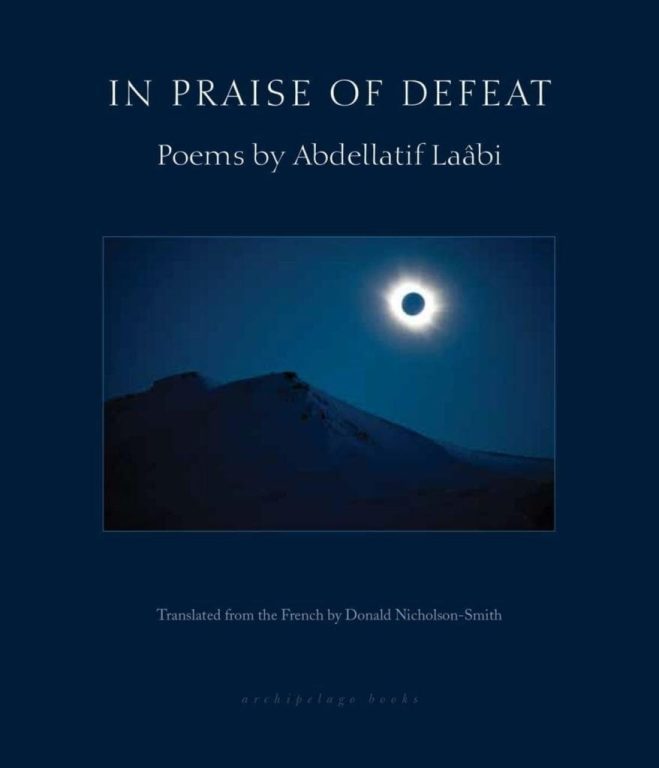
Donald Nicholson-Smith is a translator and freelance editor. Born in Manchester, England, he is a long-time resident of New York City. His translations include works by Thierry Jonquet, Guy Debord, Paco Ignacio Taibo II, Henri Lefebvre, Guillaume Apollinaire, Raoul Vaneigem, Antonin Artaud, Yasmina Khadra (with Alyson Waters), Jean-Patrick Manchette, and Serge Pey. He won the 2015 French-American Foundation Translation Prize for his translation of Manchette’s The Mad and the Bad. His translation of Abdellatif Laâbi’s In Praise of Defeat, including self-selected poems from the Moroccan author and dissident’s long career, was a finalist for the Griffin Poetry Prize in 2017. Nicholson-Smith has been dubbed Chevalier des Arts et des Lettres in recognition of his services to French literature in translation.

Judges’ Citation
In this bilingual book (Laâbi’s original French and Nicolson-Smith’s English) – a book that is monumental both in size (over 800 pages) and in scope – we meet one of the major poets of our time, one who has lived through great and catastrophic events and responded to them with a passionate intelligent humanity.
Selected poems
by Donald Nicholson-Smith
Write, write, never stop. Tonight and all the nights to come. When I am at last face to face with myself. And must take stock. No more uniform. No longer distractedly pacing a measured area for the regulation exercise period. No more obeying wretched orders. My number still on the other side of the door. When I am done with drinking, eating, urinating, defecating. Done with talking, with calling things by their worn-out names. I light endless cigarettes whose smoke emerges from my lungs in broken chains, bitter swirls of rejection. Prison night has gobbled up the artificial light of the day. Ragged stars populate the vault of my visions.
Write.
When I stop, my voice begins to sound very peculiar. As though unknown notes were clinging to its cords, driven by strange storms from all those zones where life and death watch and spy on one another, two oddly hued wild animals, each crouched ready to spring, ready to slash and destroy the other’s essential nature.
Write.
I can live now only by wrenching myself away from myself, by wrenching away from myself my points of rupture and suture, those places where I most acutely feel splits and junctures, where I cut myself into pieces so as to return to life in unfathomable elsewheres: earth, roots, trees of intensity, granular effervescene under the sun.
Copyright © 2016 by Donald Nicholson-Smith (translation of French written by Abdellatif Laâbi), In Praise of Defeat, Archipelago Books
from “Chronicle of the Citadel of Exile”
the French written by Abdellatif Laabi
Good morning sun of my land
how good it feels to be alive today
so much light
so much light around me
Good morning empty exercise yard
you have become familiar to me
I cross you with a lively step
and you suit me like an elegant shoe
Good morning ponderous and philosophical oxpecker
perched up there
on the wall that hides the world from me
poking at your ribcage
with distracted little movements
Good morning sparse grass in the alley
quivering in opalescent flurries
at the wind’s teasing touch
Good morning great lone palm
erect on your cross-grained trunk
blooming at your peak
like a glorious tulip
Good morning sun of my land
tide of presence abolishing exile
So much light
so much light around me
* * *
I have a thousand reasons to live
to vanquish day-to-day death
the joy of loving you
and walking in step with hope
* * *
So many years
without ever knowing
solitude or boredom
so many shooting stars in my head
The reservoir of tenderness hums
in plainsong chant
the prisoner’s peculiar happiness
(. . . )
Copyright © 2016 by Donald Nicholson-Smith (translation of French written by Abdellatif Laâbi), In Praise of Defeat, Archipelago Books
from “Good Morning Sun of My Land”
the French written by Abdellatif Laabi
My double
an old acquaintance
whom I visit with moderation
He is a shameless fellow
who plays on my shyness
and has the knack of profiting
from my distractedness
He is the shadow
who follows or precedes me
aping my walk
He even winkles his way into my dreams
and speaks the language of my demons
fluently
Despite our close intimacy
he is still a stranger to me
I neither hate nor love him
for after all
he is my double
the proof by default
of my existence
Copyright © 2016 by Donald Nicholson-Smith (translation of French written by Abdellatif Laâbi), In Praise of Defeat, Archipelago Books
from “My Dear Double”
the French written by Abdellatif Laabi
- Translation Relay: Interview with Donald Nicholson-Smith Words Without Borders
- Interview with Donald Nicholson-Smith BookForum